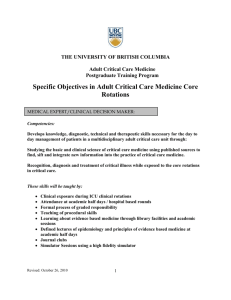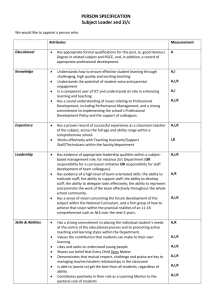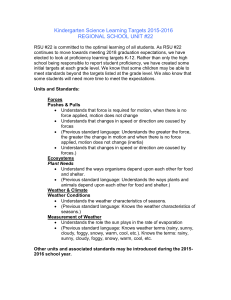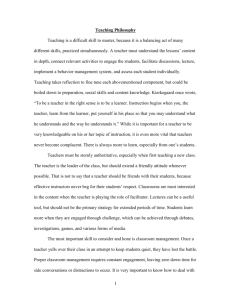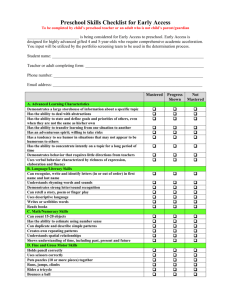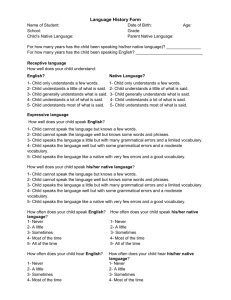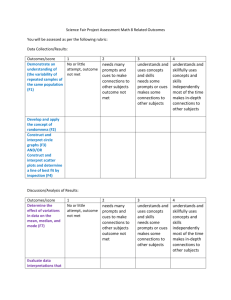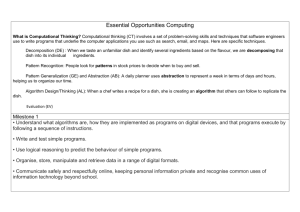Rotation Specific Objectives Acute Care Cardiology Rotations
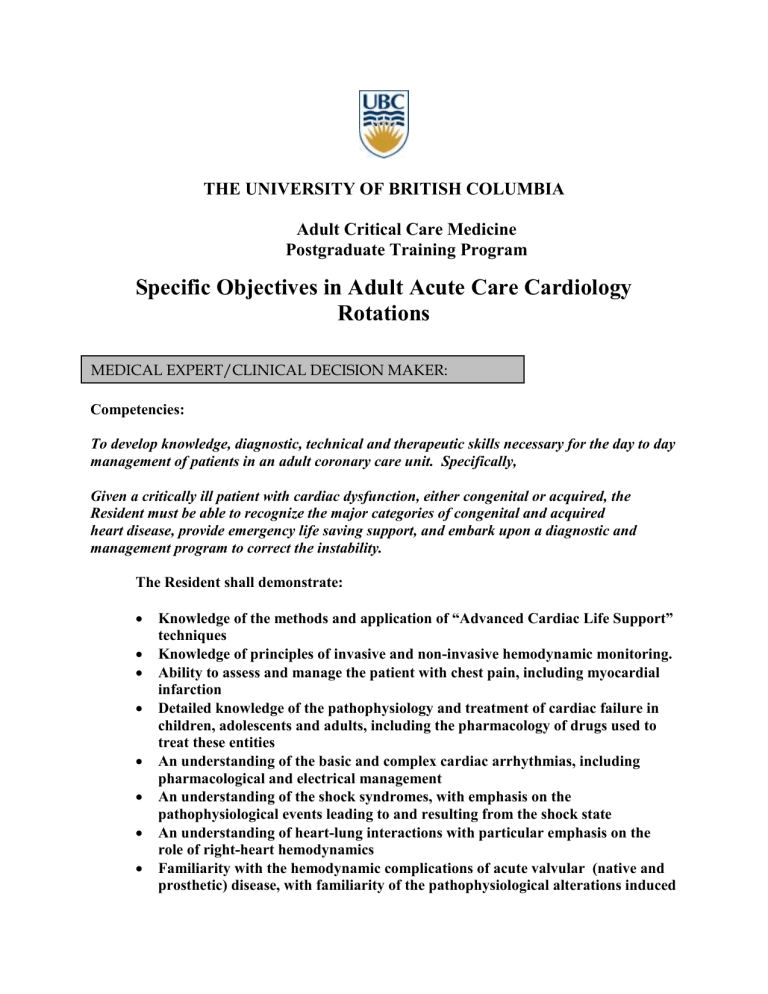
THE UNIVERSITY OF BRITISH COLUMBIA
Adult Critical Care Medicine
Postgraduate Training Program
Specific Objectives in Adult Acute Care Cardiology
Rotations
MEDICAL EXPERT/CLINICAL DECISION MAKER:
Competencies:
To develop knowledge, diagnostic, technical and therapeutic skills necessary for the day to day management of patients in an adult coronary care unit. Specifically,
Given a critically ill patient with cardiac dysfunction, either congenital or acquired, the
Resident must be able to recognize the major categories of congenital and acquired heart disease, provide emergency life saving support, and embark upon a diagnostic and management program to correct the instability.
The Resident shall demonstrate:
Knowledge of the methods and application of “Advanced Cardiac Life Support” techniques
Knowledge of principles of invasive and non-invasive hemodynamic monitoring.
Ability to assess and manage the patient with chest pain, including myocardial infarction
Detailed knowledge of the pathophysiology and treatment of cardiac failure in children, adolescents and adults, including the pharmacology of drugs used to treat these entities
An understanding of the basic and complex cardiac arrhythmias, including pharmacological and electrical management
An understanding of the shock syndromes, with emphasis on the pathophysiological events leading to and resulting from the shock state
An understanding of heart-lung interactions with particular emphasis on the role of right-heart hemodynamics
Familiarity with the hemodynamic complications of acute valvular (native and prosthetic) disease, with familiarity of the pathophysiological alterations induced
by chronic valvular disease in critically ill patients
Familiarity with the management of problems associated with cardiac and vascular surgical interventions in children and adults
Familiarity with the congenital malformations of the vascular system leading to heart failure and/or hypoxemia
Technical Skills:
Insertion, testing and use of temporary pacemakers
Indications, contraindications and use of intra-aortic balloon pump in the treatment of acute myocardial infarction and cardiogenic shock
These skills will be taught by:
studying the basic and clinical science of acute care cardiology using published sources to find, sift and integrate new information into the practice of critical care medicine
recognition, diagnosis and treatment of critical illness while exposed to the acute care cardiology rotations in critical care
attendance at academic half days / hospital based rounds
formal process of graded responsibility
teaching of procedural skills
learning about evidence based medicine through library facilities and academic sessions
Defined lectures of epidemiology and principles of evidence based medicine at academic half days
Journal clubs
These skills will be evaluated by:
monitoring of performance at daily ward rounds
in training evaluations at mid-term and completion of designated core and elective rotations
annually partaking the MCCKAP written examination sponsored by the Society of
Critical Care Medicine
twice yearly oral examinations
quarterly review of performance by Program Director and other members of the
Division of Critical Care Medicine
performance of research and quality assurance/improvement projects
presentation of research projects at the annual Residents Research Competition
in-training evaluations and meeting of expectations
COMMUNICATOR:
Competencies:
Establishes effective communication with patients and their families
Establishes effective communication with medical and non-medical colleagues
Acts as a consultant and co-ordinate management involving a number of consultants
Able to refer problem issues or problem cases appropriately
Learns to communicate effectively and efficiently with colleagues both verbally and through written records (medical records, discharge summaries, consultation reports, family conferences)
These skills will be taught and assessed by:
daily observation of trainee performance by clinical supervisors with regular feedback
observation of Resident – staff interaction during rotations
a review of the written records by the attending physicians with ongoing feedback
COLLABORATOR:
Competencies:
Effectively consults with other physicians and health care professionals
Works effectively as part of multi-disciplinary team
Acts as a leader of a multidisciplinary team
Contributes to the education of medical, nursing and paramedical staff
These skills will be taught by:
observation of daily practice patterns with regular feedback
attendance at interdisciplinary rounds
These skills will be evaluated by:
direct observation
feedback through in-training evaluation
MANAGER:
Knows the duties of an intensive care specialist and director of the coronary care unit
Understands the principles of administration and management
Understands the principles of departmental budgeting, financial management
Learns how to utilize resources to effectively balance patient care and health care economics
Works to develop effective and efficient patient management strategies by:
avoiding duplication of services
involving other caregivers
appropriate use of information technology
knows the physical requirements of a coronary care unit design
understands the factors that determine optimum staff establishment for specialist and junior medical; staff, nurses, paramedical and secretarial staff
understands the process of selecting, ordering and maintaining equipment
contributes to unit activities and encourages others to do so by instilling enthusiasm amongst colleagues in the work place
recognizes impaired performance in self and in professional colleagues
contributes to professional meetings and understands their rules, structure and etiquette
understands the issues in organizing a scientific meeting
understands the ethical and legal implications of intensive care practice
creates a congenial and stimulating work environment
learns how to delegate responsibilities in a fair and non-threatening manner
recognizes and manages problems with junior staff in a non-threatening and constructive manner
-
Understands the need and can undertake clinical audit
-
Understands the different types of clinical audit in the intensive care unit
-
Recognizes the need for clinical audit and quality improvement activities not to be threatening or punitive to individuals
Encourages others to participate in clinical audit and QI activities,
Understands current and future trends in developments in biomedical technology, computers and instrumentation within the coronary care unit
Understands the role of the coronary care unit in Hospital or regional disaster planning
-
Understands issues related to the organization and audit of specialized resuscitation teams within and outside the hospitals and the role of the coronary care unit as contributor to these teams
These skills will be taught in the following manner:
attendance to formal lectures in ICU administration at academic half day
attendance at monthly ICU QA/QI meetings
assignment of annual QI projects
learning computer skills
These skills will be evaluated by:
observation of trainees by rotation supervisors and attending physicians with feedback on a regular basis and through ITER’s
attendance at academic half days
HEALTH ADVOCATE:
Competencies:
Recognizes the risk factors for a variety of common heart critical illnesses and counsel families and colleagues in ways to minimize the acquisition risk
Develops the ethic that the patient’s welfare always takes precedence in the event of medical, political or ethical conflicts
Appreciates the difficult and stressful situations associated with the environment of critical care
Learns to identify and minimize the stresses placed upon the patients, their relatives, and hospital staff
These skills will be taught by:
observation of practices of attending physicians and other members of the interdisciplinary team
Annual series of ethical seminars in academic days
ethical case discussions at morning clinical ward rounds and academic half days
These skills will be evaluated by:
provision of feedback through ITER’s
SCHOLAR:
Competencies:
Accumulates the necessary knowledge to be a competent critical care physician
Learns how to apply basic and clinical science to patient care
Establishes a comprehensive self-directed learning and educational strategy
Imparts a similar enthusiasm to colleagues
Develops an appreciation of the role of critical appraisal in the assessment of current scientific developments
Develops an understanding of evidence based medicine
Participates in processes of clinical audit and quality improvement activities
Maintains competence in critical care
Commits to forever pushing the boundaries of excellence in caring for critically ill patients
These skills will be taught by:
Provision of appropriate teaching courses at academic half days
UBC course in Effective Teaching Techniques
Critical appraisal of the literature at Journal Club sessions
Assignment and completion of QI/Research projects
These skills will be evaluated and monitored by:
monitoring of attendance at academic half days
regular formal and informal feedback
formal feedback through ITER’s
written examination
assessing teaching skills during rounds and lectures to junior staff and other members of the health care team
presentation of Research and QI projects at the Annual Residents Research competition
PROFESSIONAL:
Competencies:
Develops an ethical framework for the delivery of the highest quality care
Understands professional obligations to patients and colleagues
Exhibits appropriate personal and interpersonal professional behaviors
Acts with integrity, honesty, fairness and compassion in the delivery of the highest quality health care
These skills will be taught by:
lectures at academic half days
observation of the daily practice patterns of attending physicians and other health care workers
These skills will be evaluated by:
daily observation of trainees by attending physicians
formal evaluations through ITER’s
annual meetings with the Program Director
